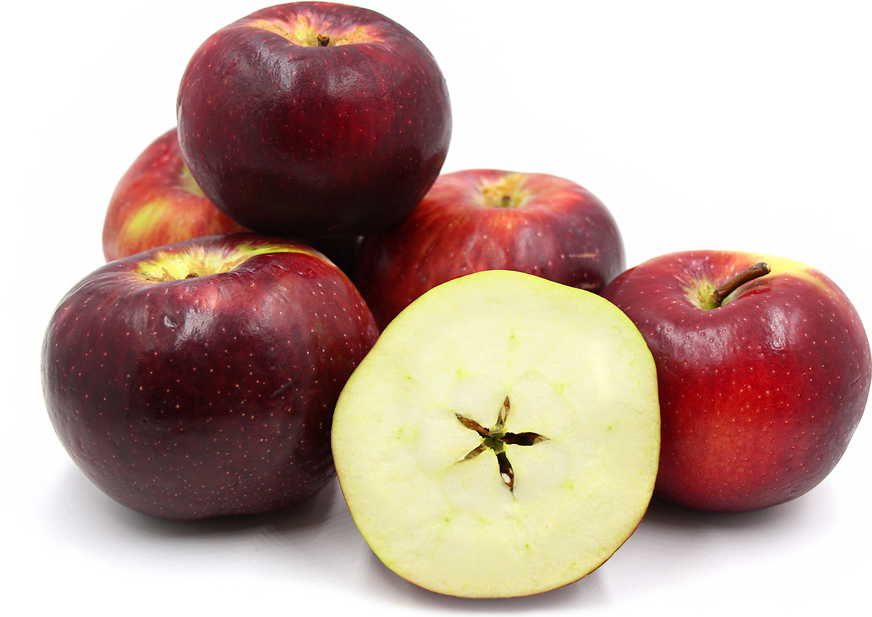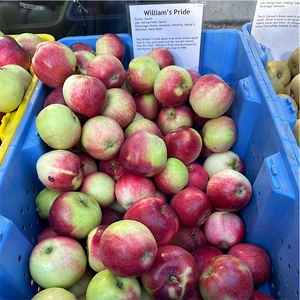


Williams' Pride Apples
Estimated Inventory, lb : 0
Description/Taste
Williams’ Pride apples are a medium to large varietal, averaging 6 to 8 centimeters in diameter, and have a relatively uniform round, conical, to ovate shape with faint ribbing. The apple’s skin is semi-thick, tough, and slightly chewy with a waxy, glossy, and smooth surface. The skin also has a yellow-green base coloring, almost entirely enveloped in a burgundy, maroon to dark red blush, pocked with tiny, white lenticels. Underneath the surface, the flesh ranges in color from white to pale yellow and has a medium-grained, firm, aqueous, and crisp consistency. The flesh also encases a central core filled with small, oval to tear-drop-shaped black-brown seeds. Williams’ Pride apples have a faint aroma and a balanced, sweet-tart flavor with tangy, honeyed undertones. The taste of the flesh may vary, depending on the time in the season when the fruits are harvested, but some apple enthusiasts note that the variety sometimes emits spice-filled, fruity nuances reminiscent of pears, cherries, or melons.
Seasons/Availability
Williams’ Pride apples are available in the mid-summer through early fall.
Current Facts
Williams’ Pride apples, botanically classified as Malus domestica, are an early-season variety belonging to the Rosaceae family. The American cultivar was developed in the late 20th century through the famous apple breeding program Purdue, Rutgers, and Illinois Co-Op, or PRI, and was selected from trials conducted to create new apple varieties with increased resistance to disease. Williams’ Pride apples are a mid-summer cultivar distinct from other early-season types with extended storage capabilities, rich flavor, and crisp flesh. The apples are hardy, able to withstand cold climates, are resistant to disease, and will keep their dense nature for up to six weeks, a quality not typically found in early apples. Since their release, Williams’ Pride apples are grown on a small scale in the Eastern and Central United States and are a seasonal favorite sought after by apple enthusiasts. The apples are also known as Co-Op 23 and are generally considered an all-purpose cultivar, utilized mostly fresh but can be incorporated into some cooked preparations.
Nutritional Value
Williams’ Pride apples are a source of fiber to regulate the digestive tract and potassium to balance fluid levels within the body. The apples also contain vitamin C to strengthen the immune system, reduce inflammation, and boost collagen production within the skin, and provide vitamin E to protect the cells against free radical damage, vitamin A to maintain healthy organs, and vitamin K to assist in faster wound healing. Beyond vitamins, Williams’ Pride apples contain lower amounts of nutrients, including antioxidants, zinc, iron, copper, and magnesium.
Applications
Williams’ Pride apples have a sweet-tart flavor well-suited for raw and cooked preparations. The apples can be consumed straight, out of hand, with or without the skin, depending on preference, or they can be sliced and served on charcuterie boards. Williams’ Pride apples can also be chopped and tossed into salads, fruit bowls, slaws, and grain bowls, sliced and dipped into chocolate or caramel, layered over nut butter toast, or blended into smoothies. Beyond fresh preparations, Williams’ Pride apples are popularly incorporated into baked goods such as pies, tarts, crumbles, and crisps, or they can be simmered into a sauce. The pigmented nature of the apple’s skin imparts a pleasant, subtly pink hue to cooked dishes. Williams’ Pride apples can also be sauteed with brown sugar, butter, and spices to create a rich topping for ice cream, stuffed and baked as a healthy dessert, simmered into a sauce for roasted meats or sliced into thin pieces and dried for extended use. Williams’ Pride apples pair well with spices such as ginger, nutmeg, cinnamon, cloves, and allspice, vanilla, caramel, chocolate, dried fruits including raisins, cranberries, and cherries, and nuts such as pecans, walnuts, and pine. Whole, unwashed Williams’ Pride apples will keep several weeks when stored in the refrigerator and up to six weeks in professional cold storage.
Ethnic/Cultural Info
Williams’ Pride apples were named after the professor and breeder Edwin B. Williams of Purdue University. Williams earned his Master’s and Doctorate Degrees at Purdue University, and approximately four years after completing his schooling, Williams began working in the Botany and Plant Pathology Department at Purdue in 1954. During his thirty-year career at the university, Williams contributed research to over one hundred publications, spoke at apple symposiums worldwide, and developed ten new apple varieties. Williams sought to create new cultivars with improved resistance to disease, and Williams’ Pride apples were one of the successful varieties favored and selected by Williams to be released to the public.
Geography/History
Williams’ Pride apples were developed in the late 20th century through the Purdue, Rutgers, and Illinois, PRI, Cooperative Apple Breeding Program. The cultivar was chosen from a breeding initiative at PRI to create an apple variety resistant to disease and was first grown in Block F of the Hinsley Breeding Orchard at Purdue University in 1975. Williams’ Pride apples were created from a cross between seedlings known as PRI 1018-101 and NJ 50 and were selected for propagation in 1979. The variety was released to commercial markets in 1988 and was the eighth cultivar to be released from the program. Today Williams’ Pride apples have been planted in at least thirty-five locations in North America, Africa, Asia, and Europe and are being researched for improved cultivation methods. The variety is also grown through select specialty orchards and home gardeners throughout the Eastern and Central United States, sold through local markets, distributors, and farm stands when in season.
Recipe Ideas
Recipes that include Williams' Pride Apples. One
| Salt In My Coffee |
|
Paleo Maple Caramel Apples |
| Framed Cooks cook, click, eat, repeat |
|
Raspberry Applesauce |
| Salt In My Coffee |
|
MAPLE SPICED APPLE BUTTER (Paleo & Refined Sugar-Free) |








